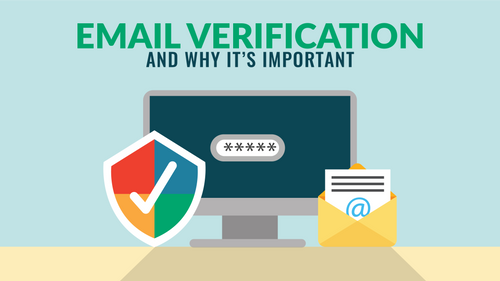In today's digital landscape, email is the linchpin of online communication. Whether you're sending an important business proposal or keeping in touch with family and friends, email is your digital postal service. But how can you be sure that the email you send reaches its intended destination? This is where email verification comes into play. In this extensive guide, we will delve deep into the definition of email verification, its significance, and its wide-ranging applications. By the end of this journey, you'll have a profound understanding of the critical role that email verification plays in the digital world.
What Is Email Verification?
Email verification is the process of confirming the accuracy, validity, and deliverability of an email address. It involves a series of checks and validations to ensure that the email address provided is both legitimate and capable of receiving emails. At its core, email verification serves as a gatekeeper, preventing undeliverable, invalid, or potentially harmful emails from entering your inbox or being sent to others.
The Components of Email Verification
To fully grasp the concept of email verification, it's essential to understand its core components:
Syntax Verification: This checks whether the email address follows the correct syntax rules. For example, it ensures that there are no spaces, special characters in inappropriate places, or missing "@" symbols.
Domain Validation: Domain validation verifies that the domain (e.g., gmail.com, yahoo.com) in the email address exists and is currently active. It also checks if the domain has a valid mail exchange (MX) record, indicating that it can receive emails.
SMTP Verification: SMTP (Simple Mail Transfer Protocol) verification connects to the recipient's email server and checks if the email address is valid and can accept messages. This step is essential in determining the deliverability of an email.
Disposable Email Detection: Disposable email addresses are often temporary and associated with spam or fraudulent activities. Email verification can detect such addresses and block them.
Role-Based Email Identification: Some email addresses are associated with roles within organizations (e.g., [email protected]). Identifying and flagging role-based emails can help in managing email lists effectively.
Catch-All Domain Detection: Catch-all domains accept emails sent to any address at that domain. While this is convenient, it can also be a sign of lower email quality. Email verification can identify catch-all domains.
The Significance of Email Verification
Email verification is not just a technical process; it is a vital component of modern communication, marketing, and data management. Here's why it's so significant:
1. Improved Deliverability
Email verification ensures that your emails are sent to valid and active email addresses. This significantly reduces bounce rates, ensuring that your messages reach the intended recipients.
2. Enhanced Sender Reputation
Email service providers consider sender reputation when deciding whether to deliver an email to the inbox or spam folder. Verifying your email list helps maintain a positive sender reputation.
3. Cost-Efficiency
Sending emails to invalid or non-existent addresses wastes resources and can result in higher email marketing costs. Email verification helps optimize your email campaigns.
4. Data Quality
High-quality data is crucial for decision-making. Email verification ensures that your databases are accurate and up-to-date, leading to better insights and analytics.
5. Spam Prevention
Spammers often use invalid or disposable email addresses. By filtering out these addresses through verification, you can protect your communication channels from spam.
6. Regulatory Compliance
Email verification helps you comply with data protection regulations. It ensures that you have consent to contact individuals via email, reducing the risk of legal issues.
Real-Life Applications of Email Verification
Email verification extends its benefits to various domains and industries. Here are some real-life applications:
1. Email Marketing
Email verification is a cornerstone of successful email marketing campaigns. It ensures that marketing emails reach the target audience and drive engagement.
2. Account Registration
Online platforms use email verification to confirm user identities during registration. It's a critical step in preventing fake accounts and ensuring security.
3. E-commerce
E-commerce businesses use email verification to confirm customer identities and deliver order notifications. It also helps in reducing cart abandonment rates.
4. Customer Support
Email verification is used by customer support teams to verify customer identities and provide account-related assistance securely.
5. Recruitment
Recruitment agencies use email verification to ensure that they can reach candidates for job opportunities and updates
.
6. Fraud Prevention
Financial institutions and online payment processors employ email verification to detect and prevent fraudulent transactions.
Frequently Asked Questions (FAQs)
Let's address some common questions about email verification:
1. Is email verification the same as email validation?
While these terms are often used interchangeably, email verification typically involves a more comprehensive process that includes syntax validation, domain validation, and SMTP verification. Email validation can refer to a simpler check for correct syntax.
2. Is email verification 100% accurate?
No email verification process is entirely foolproof, but it significantly improves accuracy by filtering out invalid and undeliverable email addresses.
3. Can email verification detect disposable email addresses?
Yes, email verification can identify and block disposable email addresses, which are often used for temporary purposes or spam.
4. How often should I verify my email list?
The frequency of email verification depends on your email list's size and how frequently you collect new addresses. For active email lists, verification every 3-6 months is recommended.
5. Is email verification legal and compliant with data privacy laws?
Yes, email verification is legal and helps businesses comply with data privacy regulations by ensuring that they have valid consent to contact individuals via email.
Conclusion
In the digital age, where communication and data accuracy are paramount, email verification emerges as a crucial tool. It ensures that emails reach their intended destinations, maintains sender reputation, reduces costs, and enhances data quality. Email verification's significance extends across industries, impacting email marketing, account registration, e-commerce, and more. Understanding the intricacies of email verification allows individuals and businesses to harness its power for effective and secure communication. It's not merely a technical process; it's a fundamental pillar of modern digital interactions.



